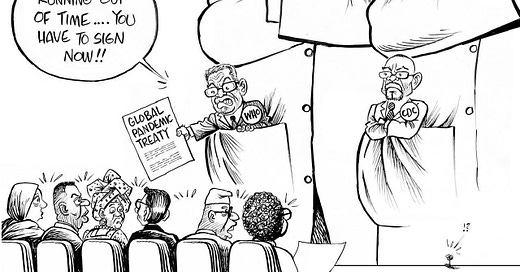URGENT ACTION: PROPOSAL FOR A TRANSPARENT VOTE AT WHA 77
Instead of a bogus WHO consensus procedure, where dissenting countries are often excluded, use this document to force a proper and transparent vote or halt the process
This is a proposal for a resolution I drafted for a country or countries whose name/s I shall not mention. I do not want them to be distracted or coerced.
PLEASE get this document out as widely as possible, so member state delegates with ethics and integrity can use it to push for a clear vote at WHA 77 tomorrow.
If the WHO goes the usual consensus route (not a vote), they may succeed in fooling the world that everyone agrees with them at the WHA 77. We don’t.
Tell your member state delegates and politicians: nothing for us without us.
TEXT VERSION TO COPY PASTE:
Urgent Proposal for Resolution at WHA 77
Friday 31 May 2024
1. (COUNTRY / COUNTRIES / BLOC) urgently propose/s for:
a) the International Health Regulations (A77/9) amendments, and
b) decisions with regards to the proposed new pandemic treaty (A77/10)
to be put to a live and publicly broadcast vote, with all member states of the WHO participating.
2. The COUNTRY / COUNTRIES / BLOC notes that certain member states are not participating fully in the negotiations, decision-making and voting, because they are in arrears with payments to the WHO, or they have been unable to stay the entire week of the WHA 77, or they choose to abstain in protest.
3. Reasoning for this motion includes, but is not limited to, what is being reported by attending media:
a) Several negotiators from both developed and developing countries are exhausted with accelerated negotiations conducted by the INB and WGIHR, for the past one year, and the marathon negotiations over the last eight weeks. The negotiators of smaller size delegations have been working even through weekdays and weekends, deprived of their personal and family time, challenging their endurance.
b) Negotiating through WHA77 or negotiating in a rushed manner by suspending WHA77 for a few days was not a preferred option for many delegations. Some member states prefer 6 to 24 months to continue negotiating. The World Health Organisation will be wise to accommodate this preference.
c) India told the INB Bureau that the INB is negotiating on very crucial issues, which puts human lives at stake, and there is no need to rush to conclude the negotiations - which can have unintended negative consequences. As this is the World Health Assembly, surely lives must take a priority.
d) Several developed and developing countries spoke about the way negotiations are conducted and how it is forcing convergence on drafts that ignores real public health concerns. According to negotiators who spent a whole day on PABS, DG Tedros sat through the negotiations and intervened, attempting to make compromises primarily on proposals from developing countries. This is disturbing.
e) Sources also confirmed that the DG had reached out to certain country capitals, whose delegations were actively seeking deliverables on so-called equity in the pandemic instrument. This was resisted by more developed countries. He requested developing country ministries to discourage their delegations from making demands to address inequities in the draft, giving priority to reaching a deal.
f) Not nearly enough public participation on these two treaties has taken place at a member state or a WHO level. If the negotiating text of either document is summarily adopted, it will further entrench the deep inequities existing between developing and developed countries, when it comes to public participation, policy-making, and decision-making on health emergency preparedness and response.
g) Politicians, lawyers, and civil society continue to raise the legitimacy of exclusive decision-making. In addition to 2022 voting anomalies on the IHR 2005, the notice period in Article 55(2) of the IHR 2005 is not met. Final documents must be provided to member states at least four months in advance. These matters are raised in statement of disputes by civil society organisations, served on the WHO.
4. COUNTRY / COUNTRIES / BLOC therefore affirms that the entire negotiation process must be halted until World Health Assembly 78 at minimum, or WHA 80 at best, or a transparent vote (and not consensus process) must take place.
Signed:
Thank you for supporting my work and that of the organisations I work with.
If you would like to volunteer your skills/networks, please do let me know.






